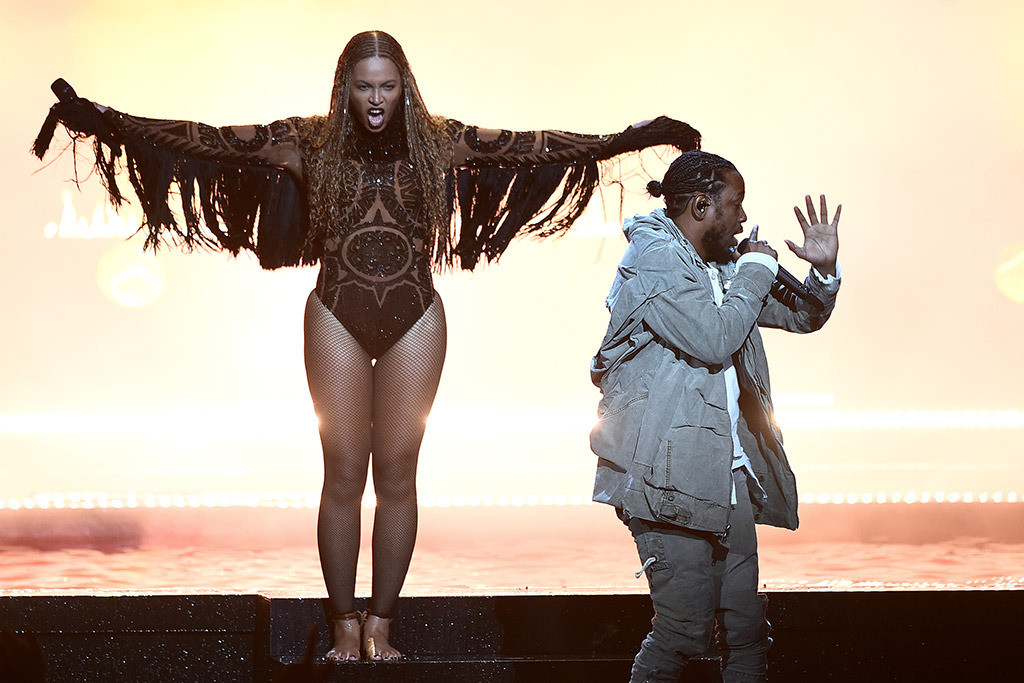
In the world of music, 2016 was owned by Beyoncé. Starting the year off with a stunningly strong Super Bowl performance, she followed it up by releasing the monumental visual album Lemonade. A hitmaker in her career, she completely threw hits aside to make a no-holds-barred thematic statement celebrating the power and tenacity of black women in America, filtered in part through her own journey after she discovered that her husband Jay Z was having an affair (the details are still unconfirmed, but evidence in the the last two years, and the lyrical content of Lemonade, not to mention the lack of any public denial, have made it all but certain). The visual album displays Beyoncé's full range of emotions, from anger to reconciliation, which is accompanied by powerful footage of black women in the South and the mothers of recent police shooting victims, suggesting generations of black women who have survived and persevered against unbelievable odds. With Bey-narrated poetry in between the songs, the work comes to us complete, not just a collection of music videos. This is one journey, a visual and musical composition simultaneously telling one and, then again, a million stories, all at once. Beyoncé puts herself completely out there - both her relationship and her politics - with zero fear. It's a truly inspiring experience to see and, of course, hear.
Beyoncé's Super Bowl performance was only the beginning of some legendary TV spots at multiple awards ceremonies, where she proved that the black power politics of Lemonade were not specific to the album. Always a diva, nearly worshipped by fans, Beyoncé was now firmly taking a stand in black politics in a year of political turmoil. At the BET Awards, she blew the roof off with a performance of her track "Freedom" from Lemonade that included blasting fire, ankle deep in water, rapper Kendrick Lamar rising from the underground like a Star Wars character, and an entrance with dancers coming down the aisles to the sound of a Martin Luther King speech. Rolling Stone described the performance as "ferocious", and I'm not sure that there's a better word to describe it. The political content could be felt beyond the MLK sample - the cries of "Freedom", the African style stomping dance, the both furious and jubilant kicking of water by the singer and rapper - it was a classic.
When she wasn't crying out for black lives and equal rights, Beyoncé proved that sometimes being political takes nothing more than simply showing up. She and the Dixie Chicks played a surprise performance of "Daddy Lessons", her country song from Lemonade, at the Country Music Awards, and though it was an inspired version and flawless show that was met largely with positivity, it set off a social media war of controversy between conservative country fans and hardcore fans of Beyoncé (the Beyhive). Some country fans felt that Beyoncé and the Dixie Chicks had no business being on the CMA's. A few comments were downright racist, while others lashed out at what they perceived as the un-American nature of the artists: as one post said, "One doesn’t believe in America & our police force while the other didn’t support our President & veterans during war". The CMA organization stood by their decision to have the two perform together.
Of course, there was yet one more controversy that reeked of insipid racism at one more awards ceremony - the Grammys. Music critics and fans everywhere are still trying to make sense out of how Beyoncé's ground-breaking Lemonade could somehow not be awarded album of the year. Many speculate that it is the conservative and traditional nature of an aging awards committee, who are averse to the new electronic, hip-hop infused R&B of the modern era where "real instruments" often aren't played, and music is consumed through streaming rather than the traditional CD. Winner Adele, whose album 25 was a true throwback to the CD era, was an obvious choice in this scenario. Many believed that the largely white committee really didn't surprise anyone in their slighting of Beyoncé, who watched Adele sweep the awards while she received only two - one a confusing "Urban Contemporary" award that many believe is simply a category that the Grammy's came up with to fend off criticism for being out of touch with the most popular (and black) music in the world. Their R&B category is still nominating artists reminiscent of a 90's gospel-tinged version of the genre, a version that has almost no relevance in today's pop music climate. The racist undertones of the "Urban Contemporary" category, coupled with the sweep of the night's top two prizes by Adele, have caused speculation that more black artists may take Frank Ocean's lead and boycott the awards in the future. Even Adele, while obviously excited to receive her armful of trophies, felt the injustice of it all, saying during her acceptance speech for 25, “I can’t possibly accept this award. The artist of my life is Beyoncé, and this album to me, the Lemonade album, was just so monumental.”
In the end, does Queen Bey really need a Grammy to prove anything? Her tears at the show certainly indicated that she certainly wouldn't mind getting recognized for her efforts (this isn't the first slight she's received at the Grammys). That said, for her fans, a Grammy isn't going to stop them from loving and appreciating her. And no one can take away the massive impact that Beyoncé had last year as an artist and political spokesperson. With twins on the way, 2017 is certainly going to be quieter on the performance front, but I think it can be assumed that Beyoncé isn't going to leave the spotlight anytime soon, thankfully.